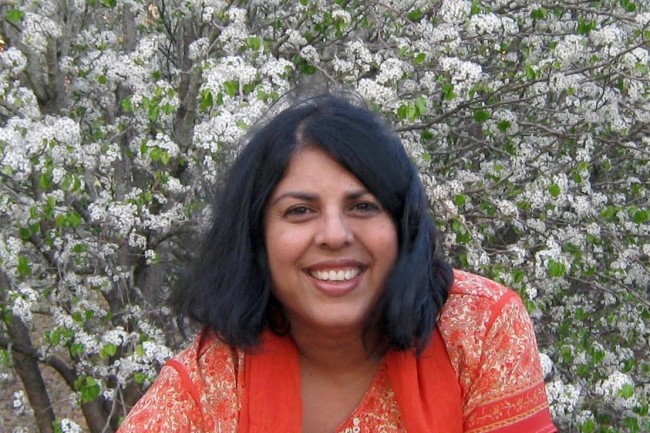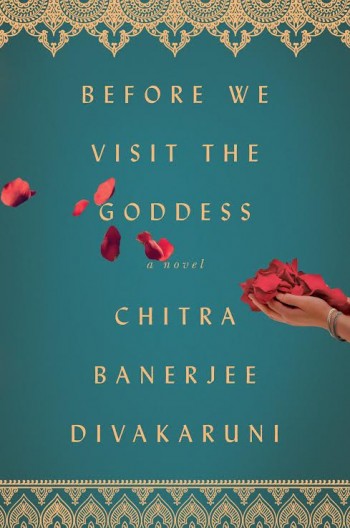BY VEENA RAO
Atlanta, GA, April 1, 2016: Chitra Banerjee Divakaruni, award-winning author and professor of creative writing at the University of Houston, is back with another powerful novel, Before We Visit the Goddess, which is slated for an April 2016 release. The novel spans two countries, two cultures and different time periods, and explores the stories of three strong-willed women as they grapple with what it means to be a daughter, a lover, a wife and a mother.
Divakaruni’s earlier works include Mistress of Spices, Sister of My Heart , The Palace of Illusions, among others.
In an exclusive interview with NRI Pulse, Divakaruni discusses the definition of success for a woman, the challenges of writing a novel-in-stories (stories that are linked with a common story-line), and her reasons for trying something significantly different with each book.
Before We Visit the Goddess is the story of three generations of ambitious women, Sabitri, Bela and Tara. What connected you to their stories? What is the genesis of the novel?
A question that I have been pondering for a long time is, what does it mean to be a successful woman? Does the definition of success change for a woman depending on the generation in which she is born and the place in which she lives? Is it something a woman can learn from her mother, or does she have to reject the wisdom of the past generation and forge a new path for herself? I wanted to explore this through the lives of three generations of women. That is how I began to imagine Sabitri, Bela and Tara, and their lives.
The story is told not only from the diverse viewpoints of its three protagonists, but it also moves back and forth in time, ending a little in the future- and the novel accomplishes this without confusing the reader. What were the challenges of writing a novel-in-stories?
The challenge of writing a novel-in-stories is that the form has to leap from one moment in the tale to a very different moment. This is at once exciting and difficult if one is to keep continuity and not confuse the reader. I had to decide, quite early in the writing, which were the moments in the lives of the women that were important and transformative, and how to move between these moments while keeping the story line straight. I further challenged myself and the reader by not following a chronological order but what I considered an emotional sequence. Overall I love this form – this is the first time I’m writing in it, but it seems to combine for me the best of the novel and the short story. It has the sharp focus of the short story and the amplitude of the novel.
The story moves from Bengal to Assam to Houston. Two of those places have been your home. What’s your connection with Assam? I couldn’t help but wonder if the Assam incident is based on your own experiences?
Actually, I have lived in Assam as well, because my father was posted there for a while. In fact, this book is unique among my books because I have lived in every single place where the main characters have lived. Although the book is not autobiographical, the geographical trajectory of this novel does follow my own life. And it is my first book in which Texas, where I have now lived for almost 14 years, features so prominently.
Before We Visit the Goddess is the title of one of the chapters in the book. What were your reasons for choosing this sub-title as the title of the book? Does it have a deeper meaning?
I like this title because it was poetic and evocative. But also it is important thematically. All three women struggle with the idea of goodness and at times feel they have fallen away from it and would like to gain forgiveness and recover what they have lost. It is this endeavor that I term “visiting the goddess”. One of my thoughts in this novel is that before we can “visit the goddess”, sometimes we have to suffer, sometimes we have to be honestly contrite, and sometimes we have to learn compassion – both for ourselves and for those who have hurt us. This is what enables us to find the sacred which exists inside of all of us.
Food is an important part of the lives of the protagonists. Why is food an important symbol for you as an author?
Food has always been important in my writing. I guess I’m just interested in food! I have a blog at www.chitradivakaruni.com where I often put up recipes, some of which I’ve created myself (though I would not claim to be as good a cook as my character Bela!)
Early on in my writing it struck me that it is often through food that we pass on customs from generation to generation and that we pass on lessons, values and stories as well through the act of cooking and/or eating together. This certainly happens in the lives of these three women. Food takes on a particularly potent meaning for the immigrant, because it is one of the few things from their original culture that is still available to them – and both Bela and Tara, living in USA, have a particular emotional relationship (though not necessarily simple and positive) with Indian food. Additionally, I always enjoy reading about food – it pulls in all of my senses as a reader – and I want to do the same for my readers in my books. I am pleased and amused when readers say that after reading my books, they get a craving for Indian food!
The three protagonists of Before We Visit the Goddess are strong but complex women. While writers identify at some level with all their characters, whose story resonates with you the most?
It was very important for me to identify equally with all three of these characters. This is because each character is a narrator of certain parts of the book. When I wrote those parts, I had to really inhabit the character, otherwise I felt the reader could not be sympathetic to the character. It was important for me that the reader should feel sympathy with each of these three women because often these women are in conflict with each other, and I knew that this would create an additional tension within the book as the reader is forced to switch sympathies with each story.
The novel opens with a quote from Manusmriti: Where women are honored, there the gods are pleased. And yet, Manusmriti is widely considered to be critical of women.
In part it is an ironic quote. It seems to point to a contradiction within our culture where our goddesses are female and sacred and worshiped in temples, and yet often in society there are many injustices towards women that are practiced and even condoned. But I say, “in part it is ironic”, because ultimately I believe the quote – when women are honored, respected, educated and given the leadership roles and the dignity they deserve, surely it creates a stronger society with positive values, one that is pleasing to the divine.
You are a co-founder and former president of Maitri, a helpline founded in 1991 for South Asian women dealing with domestic abuse. You are also on the advisory board of Daya in Houston. How much of your activism do you bring to your stories?
Working in the field of women’s rights is important to me, but I try to keep my activism in the background when I am writing. This is important because fiction works in a way that is different from expository prose, where I might argue my opinion openly. In fiction, the characters must do the work of convincing readers for me by living their complex lives. My women characters are a mix of positive and negative qualities – just like women in real life. My hope is that readers – both male and female – will embrace them in spite of their shortcomings because they are so human. My hope is that readers will identify with them and in doing so become more sensitive to the challenges that women face in everyday life.
From Arranged Marriage to Before We Visit the Goddess; has your writing process changed over the years. How have you evolved as a writer and as a person?
Each book I have written required a different method of writing and research, a different voice. Each book was a different kind of challenge that I set for myself. In Sister of My Heart, I experimented with dual narrators. In One Amazing Thing, I had my characters trapped by an earthquake in a single room for the entire novel, and the challenge was to make that restricted setting dramatic by having them tell stories to each other. In Palace of Illusions, I reinterpreted the epic story of the Mahabharat through the consciousness of a woman: Draupadi. I think over the years I‘ve learned much more about writing techniques and I hope I haven’t repeated the same mistakes! But the more I write, the more I realize what an intricate and deep art writing is, and how I’ve just scratched the surface of it, and I am filled with humility and the resolve to become a better writer. My motto, which I have put on my website, www.chitradivakaruni.com, is a quote from Michelangelo, written when he was in his 80s, “Ancora Imparo,” still I am learning. That’s how I feel.
Each book of yours is a different genre. Why is it important for you to try your hand at a different genre each time? What are the challenges of approaching a new project with a completely new perspective, plot and style?
It’s important for me to try something significantly different with each book – I feel that’s how I grow as a writer. I don’t want readers to pick up a book of mine and feel it’s just more of the same. This is, of course, challenging because one has to learn new skills as a writer each time, and even do a new kind of research. For instance I’m currently working on a mystery novel set in the tea gardens in the Himalayas. That novel has a whole different feel and pacing and required a whole different kind of research. After that, I’ll be writing a novel from the point of view of Sita, and that will provide me with unique challenges. I think perhaps it will be my most challenging project of all!






